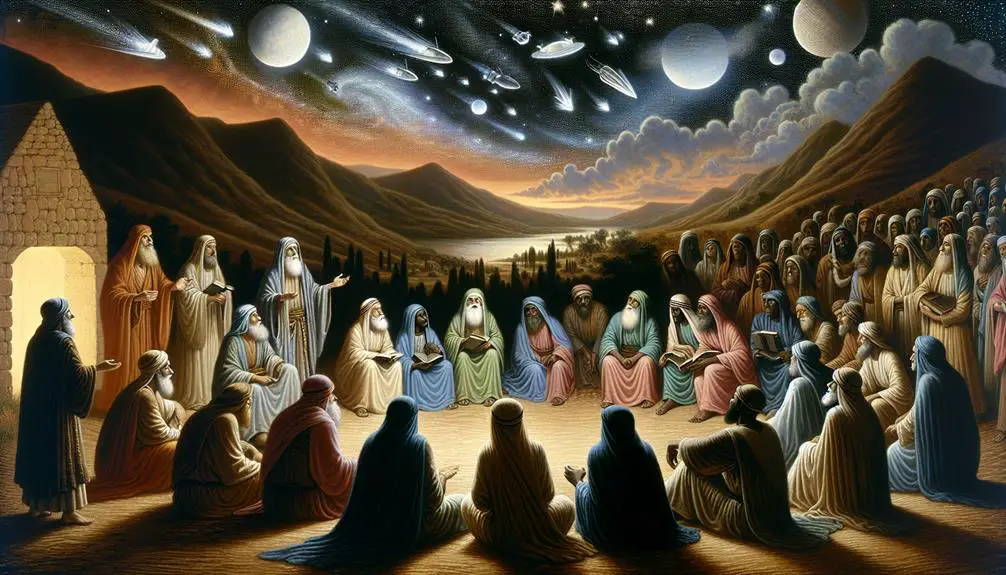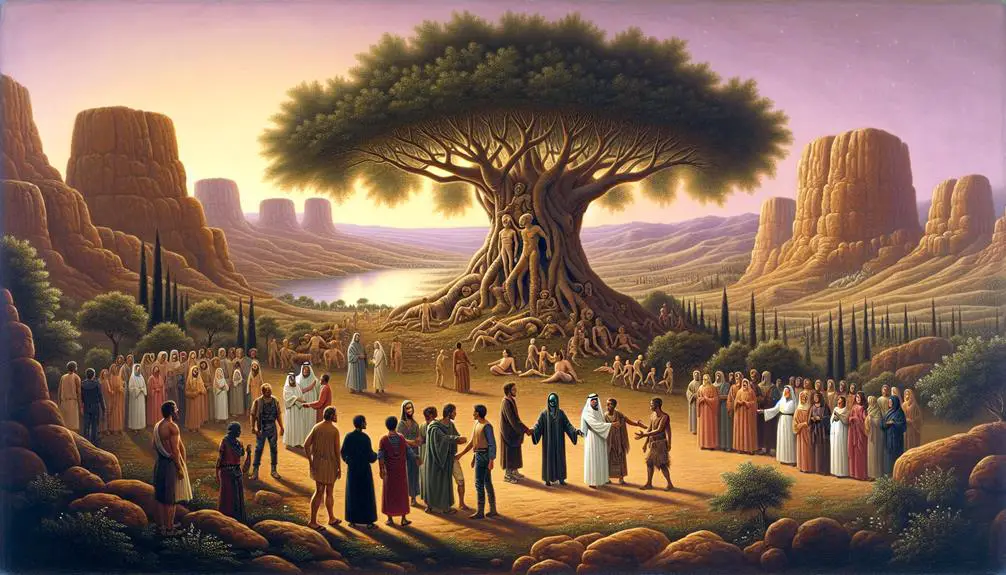Journey into ancient texts to uncover the surprising definition of 'alien' in the Bible, revealing lessons on compassion and inclusivity for today.

Alien in the Bible Meaning
You might not know that the term 'alien' in the Bible doesn't refer to extraterrestrial beings but to strangers or foreigners living among the Israelites. This concept plays a crucial role in understanding ancient Israelite society and its laws, emphasizing compassion and equal treatment.
As you explore this topic, you'll discover how these ancient texts offer timeless lessons on hospitality and inclusivity. The way aliens were integrated into society and the laws protecting them might challenge your current perceptions and inspire a fresh look at the notions of community and acceptance.
Key Takeaways
- 'Alien' in the Bible primarily refers to strangers or foreigners, emphasizing themes of belonging and divine protection.
- Biblical mandates stress kindness and justice towards aliens, advocating for their inclusion and fair treatment in society.
- The term's evolution reflects changing perceptions, from fear of outsiders to a broader notion of inclusivity and community.
- Engagements with 'aliens' in biblical narratives underscore hospitality, compassion, and the importance of transcending cultural barriers.
Definition of 'Alien' in Scripture

In scriptural context, 'alien' typically refers to individuals or peoples not belonging to the community or nation of Israel, highlighting themes of belonging, estrangement, and sometimes divine protection or instruction. The linguistic origins of the term 'alien' in the Bible are rooted in ancient Hebrew and Greek, languages in which the Bible was originally written. In Hebrew, the word often translated as 'alien' is 'ger,' which more accurately means a stranger or sojourner, indicating a temporary stay rather than permanent alienation. The Greek equivalent found in the New Testament is 'xenos,' which can mean stranger, foreigner, or even guest. This linguistic nuance suggests a complex interplay between being an outsider and being potentially integrated into the community.
Cultural perceptions of aliens, as evidenced in scripture, are multifaceted. They reflect an awareness of the social, legal, and religious distinctions between the native-born Israelites and those from other nations. However, the Bible also contains mandates for the Israelites to treat aliens with kindness and justice, recognizing their vulnerability. This is seen in commands to leave gleanings for the poor and the alien (Leviticus 19:10) and the inclusion of aliens in religious observances (Deuteronomy 16:14). Such directives underscore a tension between the acknowledgment of difference and an ethic of inclusivity and care.
Analyzing the definition of 'alien' in scripture thus unveils a rich tapestry of linguistic origins and cultural perceptions. These elements together paint a picture of how ancient societies navigated the complexities of identity, belonging, and community life.
Historical Context of Aliens

While exploring the historical context of aliens, it's crucial to understand that the treatment and perception of outsiders have evolved significantly over time, reflecting broader socio-political and religious transformations. Initially, the concept of aliens or strangers in historical texts wasn't associated with extraterrestrial beings but rather with foreigners or those outside of a specific social or religious group. The interpretation of these outsiders has been influenced heavily by cultural influences, which have shifted as societies have evolved.
Era |
Perception of Aliens |
|---|---|
Ancient Times |
Aliens were often seen as threats or subjects of curiosity, reflecting a fear of the unknown and the different. |
Middle Ages |
The concept of aliens expanded to include mythical beings, illustrating a blend of fear, superstition, and fascination. |
Modern Era |
With the advent of science fiction, aliens have come to be associated with extraterrestrial beings, reflecting humanity's expanding understanding of the universe and its possibilities. |
This evolution highlights how the term "alien" has been shaped by the fears, aspirations, and imaginative capacity of humanity. Initially rooted in the anxiety towards outsiders, it has transformed to encompass a broader, more speculative notion of life beyond Earth. These shifts in perception are not just linguistic evolutions but are deeply tied to the socio-political and religious contexts of their times. As you delve deeper into the historical context of aliens, it becomes apparent that our understanding of them—whether as foreigners or as possible extraterrestrial beings—is a mirror of our own cultural influences and anxieties.
Aliens and Israelite Laws

Exploring the Israelite laws reveals a nuanced approach to aliens, emphasizing both inclusion and regulation within their societal framework. You'll find that these ancient texts don't merely dictate the treatment of foreigners but rather weave a complex tapestry of expectations and protections designed to facilitate cultural assimilation while safeguarding the rights of all involved.
The legal framework provided for aliens living among the Israelites wasn't just about maintaining order; it was deeply rooted in a philosophy that recognized the mutual benefits of cultural exchange and integration. Laws mandated fair treatment and equal justice for aliens, underscoring the importance of legal protections in ensuring a harmonious society. These statutes weren't simply guidelines but were enforced with the same rigor as laws applied to native Israelites, highlighting a sophisticated understanding of social cohesion and the value of diverse perspectives.
However, this inclusivity came with expectations of cultural assimilation. Aliens were expected to adhere to certain key aspects of Israelite law and society, not as a means of eroding their identity, but as a process of integration that benefited both the newcomers and the host community. This delicate balance between maintaining one's culture and embracing new traditions underscores the Israelite laws' forward-thinking approach to governance and community relations.
In essence, the ancient Israelites recognized that the strength of their society lay not just in the adherence to their own traditions but in the ability to adapt to and incorporate the practices and beliefs of others. This approach ensured that legal protections for aliens went hand in hand with the expectations of cultural assimilation, fostering a society that valued diversity and mutual respect.
Compassion Towards Strangers

You're now exploring the subtopic of 'Compassion Towards Strangers,' focusing on the Biblical mandates to welcome the foreigner and love thy neighbor.
These principles underscore a broader ethical directive within the scripture, advocating for an inclusive approach towards those outside one's immediate community.
Welcoming the Foreigner
The Bible frequently emphasizes the importance of showing compassion towards strangers, urging believers to welcome foreigners with open arms. This ethos challenges individuals to confront and overcome cultural barriers and integration challenges, fostering a community that transcends geographical and ethnic divides.
The scriptural narrative proposes that such acts of kindness and acceptance aren't merely altruistic but are foundational to the fabric of a spiritually cohesive society. It suggests that the process of welcoming the foreigner involves a mutual exchange where both parties can learn and grow, thereby enriching the community as a whole.
This perspective not only enhances social integration but also mirrors a divine principle of unconditional love and acceptance, setting a precedent for how communities might navigate the complexities of cultural diversity.
Love Thy Neighbor
In light of biblical directives, showing compassion towards strangers isn't just an act of kindness but a fulfillment of the mandate to love thy neighbor. This principle underscores the importance of neighborly duties and cultural integration in a biblical context.
- Emphasizing empathy towards those unfamiliar with local customs fosters a sense of belonging.
- Promoting mutual respect amongst diverse populations underscores the biblical call for unity.
- Facilitating cultural integration serves as a testament to the universal applicability of biblical teachings.
- Encouraging the active participation of strangers in community life fulfills the scriptural obligation to love without prejudice.
- Advocating for policies that support the welfare of all residents, regardless of their origin, aligns with the broader biblical ethos of compassion and justice.
These actions not only demonstrate adherence to divine mandates but also enrich the societal fabric through inclusivity and tolerance.
Jesus and the 'Other

Exploring Jesus's interactions with the 'Other' reveals a profound engagement with those considered outsiders or aliens in biblical narratives. This engagement not only underscores his mission to include the marginalized but also opens avenues for interpreting these interactions through lenses such as extra-terrestrial interpretations and cosmic connections. These perspectives, while not traditional, invite you to consider the expansiveness of Jesus's teachings and their possible implications beyond the earthly and immediate.
In analyzing Jesus's approach to the 'Other', you'll find that his actions and words consistently challenge the societal norms of his time. He frequently interacts with those labeled as outsiders, whether due to their occupation, ethnicity, or health status, treating them with dignity and compassion. This inclusive attitude suggests a model of universality in love and acceptance, transcending conventional barriers and hinting at a more cosmic inclusivity.
The concept of extra-terrestrial interpretations, though speculative, encourages a reevaluation of the term 'alien' in biblical contexts. It prompts you to think about the 'Other' not just as foreigners or outsiders, but in a more expansive sense that could include beings beyond our current understanding or realm. Cosmic connections, on the other hand, refer to the idea that Jesus's teachings and actions resonate on a universal level, suggesting that his message of love and inclusion extends to all of creation, not limited by terrestrial boundaries.
In considering these perspectives, it's crucial to approach the texts with both an open mind and a critical eye, recognizing the balance between seeking deeper meanings and respecting the historical and cultural contexts of the biblical narratives.
Parables Involving Foreigners

In exploring the subtopic of 'Parables Involving Foreigners', you'll find that the roles of foreign figures in these narratives are pivotal for understanding biblical messages on inclusivity.
By examining how these stories advocate for welcoming the outsider, you uncover layers of ethical and theological significance.
This analysis not only enriches one's grasp of biblical teachings but also offers insights into the broader discourse on hospitality and otherness within sacred texts.
Foreign Figures' Roles
Throughout the Bible, foreign figures often serve as central characters in parables, highlighting themes of inclusivity and moral lessons across cultural boundaries. These narratives often emphasize the importance of cultural assimilation, diplomatic interactions, universal moral principles, cross-cultural understanding, and the transformative power of compassion.
These elements collectively underscore the Bible's nuanced approach to foreignness, not merely as a state of being from another place but as an opportunity for growth, learning, and mutual enrichment. By placing foreigners in roles that pivot around cultural assimilation and diplomatic interactions, the Bible crafts a tapestry of stories that advocate for a deeper understanding and acceptance of the 'other,' thereby fostering a sense of global kinship and moral universality.
Welcoming the Outsider
Parables involving foreigners vividly demonstrate how the Bible encourages us to embrace those who come from beyond our borders, advocating for a worldview that sees the outsider not as a threat but as a bearer of new insights and opportunities for communal growth. These narratives serve as a critical lens through which to examine the importance of cultural integration and the dismantling of social barriers.
Modern Interpretations

Several modern interpretations of the term 'alien' in the Bible suggest a metaphorical, rather than literal, understanding of its usage. This shift from a traditional reading opens up discussions on broader themes such as inclusion, diversity, and the nature of God's kingdom.
Two notable areas of focus in this reinterpretation are extraterrestrial speculation and cultural reinterpretation.
- Extraterrestrial speculation: Some modern interpreters have ventured into the realm of science fiction, considering whether 'alien' could connote beings from other planets or dimensions in biblical texts. While this idea is more speculative than scholarly, it reflects a growing interest in integrating scientific curiosity with spiritual beliefs.
- Cultural reinterpretation: This approach examines how the concept of being an 'alien' or 'foreigner' in biblical times translates into today's context of globalization and multicultural societies. It encourages readers to see 'aliens' as those who are different or marginalized within a community, urging a more inclusive understanding of neighborliness.
- Historical context analysis: Scholars delve into the historical and social settings of biblical times to understand the term 'alien' as it was originally intended, highlighting the transient nature of populations and the commonality of migration.
- Linguistic studies: Linguists analyze the original Hebrew and Greek texts to grasp the nuances of the word 'alien', revealing a range of meanings from stranger and foreigner to refugee.
- Theological implications: Theologians debate the implications of interpreting 'aliens' metaphorically, discussing how this affects the understanding of God's kingdom as inclusive of all peoples, not just the culturally or religiously similar.
Lessons in Hospitality

In examining the biblical concept of 'alien', it becomes evident that the scriptures offer profound lessons on the virtue of hospitality. The texts underscore the importance of transcending cultural barriers and affirming guest rights, presenting a paradigm that holds significant value even in contemporary contexts. This analysis seeks to unravel the depth of these teachings, highlighting their relevance and applicability.
The biblical narratives often depict encounters that challenge societal norms regarding strangers, urging believers to extend hospitality without reservation. This gesture of welcoming goes beyond mere politeness, signifying a profound respect for the dignity and worth of every individual, irrespective of their origin. The emphasis on breaking down cultural barriers in these accounts isn't incidental; it's a deliberate call to foster inclusivity and understanding in a world marred by divisions.
Moreover, the insistence on guest rights within these texts is telling. It conveys a clear message about the responsibilities hosts have towards their guests, advocating for a treatment that isn't just courteous but also protective and considerate. This aspect of hospitality, deeply embedded in the biblical discourse, serves as a reminder that kindness towards strangers isn't optional but a moral imperative.
Thus, the biblical instruction on hospitality, with its focus on overcoming cultural barriers and upholding guest rights, offers a timeless lesson. It challenges you to adopt a more inclusive and compassionate stance towards all, particularly the 'alien' or stranger, in your midst. In doing so, it not only enriches personal and communal life but also contributes to the creation of a more just and empathetic world.
Frequently Asked Questions
How Do Extraterrestrial Conceptions of Aliens Influence Our Understanding of the Term "Alien" in Biblical Texts?
When you examine how extraterrestrial notions shape our grasp of 'alien' in biblical texts, you're delving into the fascinating intersection of space theology and cultural interpretations.
This exploration reveals how modern encounters and stories of beings from outer space can alter and expand our understanding of ancient scriptures.
Essentially, these contemporary concepts of aliens inject fresh perspectives into our analysis, challenging traditional views and enriching our theological and cultural discourse.
Are There Any Biblical Prophecies That Believers Interpret as Predicting the Arrival or Influence of Extraterrestrial Beings?
Ironically, you're seeking prophecies in ancient texts about space visitors, as if the prophets had telescopes rather than divine vision.
While there's no direct mention of extraterrestrial beings, some believers interpret references to 'ancient astronauts' or 'cosmic messengers' as hints at such.
Analyzing these texts, it's essential to approach with scholarly objectivity, recognizing the cultural and historical contexts rather than fitting them into modern alien narratives.
How Do Varying Religious Traditions Outside of Christianity Interpret the Concept of Aliens or Foreigners in Their Sacred Texts?
In exploring how various religious traditions interpret the concept of aliens or foreigners in their sacred texts, you'll find Hindu cosmology and Sufi metaphysics offer unique perspectives.
Hindu texts, rich in cosmic narratives, suggest a universe teeming with life, possibly including extraterrestrial beings.
Sufi teachings, meanwhile, delve into metaphysical realms, hinting at existences beyond our physical world.
These interpretations broaden our understanding of the universe and our place within it.
What Are the Ethical Implications of Comparing Modern-Day Refugees and Immigrants to the "Aliens" Mentioned in Biblical Scripture?
When you compare modern-day refugees and immigrants to 'aliens' in biblical scripture, you're delving into deep ethical waters. It's crucial to consider how such comparisons impact cultural integration and uphold or undermine human rights.
Analyzing this juxtaposition requires a scholarly, objective approach, focusing on the broader implications for society and the individuals involved. It's about understanding the historical context while addressing contemporary issues of inclusion and respect for all.
Has the Term "Alien" in the Bible Ever Been Used to Justify Exclusionary or Discriminatory Practices in Contemporary Society?
Yes, the term 'alien' in contemporary society has sometimes been used to justify exclusionary or discriminatory practices. Studies show a notable trend where cultural integration and legal policies are influenced by historical interpretations.
An analytical look reveals that while aiming for objectivity, the terminology impacts the framework within which legal policies and cultural integration efforts are developed, often reflecting biases that trace back to ancient texts, including the Bible.
Conclusion
In conclusion, the concept of 'alien' in the Bible primarily symbolizes a call for compassion and hospitality towards those who are different or from foreign lands. This isn't just a historical or religious directive but a timeless ethical principle.
Consider the parable of the Good Samaritan, which transcends its ancient context to teach a universal lesson about kindness to strangers. Analyzing such texts reveals a deep-seated biblical encouragement for inclusivity and love beyond cultural and national boundaries.



Sign up